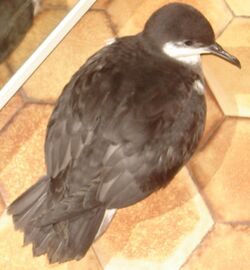Biology:Tropical shearwater
| Tropical shearwater | |
|---|---|

| |
| in Réunion | |
| Scientific classification | |
| Domain: | Eukaryota |
| Kingdom: | Animalia |
| Phylum: | Chordata |
| Class: | Aves |
| Order: | Procellariiformes |
| Family: | Procellariidae |
| Genus: | Puffinus |
| Species: | P. bailloni
|
| Binomial name | |
| Puffinus bailloni Bonaparte, 1857
| |
| Subspecies | |
|
5, see text | |
The tropical shearwater (Puffinus bailloni) is a seabird in the family Procellariidae formerly considered conspecific with Audubon's shearwater (Puffinus lherminieri).[2]
Subspecies
There are five listed subspecies of the tropical shearwater:[2]
- Puffinus bailloni nicolae – (Jouanin, 1971): breeds on islands in the northwest Indian Ocean.
- Puffinus bailloni colstoni – (Shirihai & Christie, 1996): breeds in the Aldabra Islands in the Seychelles.
- Puffinus bailloni bailloni – (Bonaparte, 1857): Mauritius, Réunion & Europa Island.
- Puffinus bailloni dichrous – (Finsch & Hartlaub, 1867): Central Pacific islands.
- Puffinus bailloni gunax – (Mathews, 1930): Vanuatu.
Range
The tropical shearwater is found in the tropical parts of the western Indian Ocean from East Africa to southern India and in similar regions of the Pacific from just to the southeast of Japan to French Polynesia.[3][4]
Population
The total population has not been definitively quantified. Aride Island in Seychelles has the world's largest population on a single island with an estimated 26,118 pairs.[5] Smaller numbers of the subspecies P. b. bailloni breed on the nearby islands of Cousin, Cousine, Recif, and a few other small rat-free islands.[6] Subspecies P. b. dichrous is estimated to number 1,000–10,000 pairs on the Line Islands and 10,000–100,000 pairs on the Phoenix Islands, with the nominate subspecies thought to number 3,000–5,000 pairs on Réunion and fewer than 100 individuals on Europa (reviewed by Brooke 2004), though it is thought there are many more breeding colonies on other islands in the Pacific. The population seems to be stable.[1]
References
- ↑ 1.0 1.1 BirdLife International (2018). "Puffinus bailloni". IUCN Red List of Threatened Species 2018: e.T22734070A132308779. doi:10.2305/IUCN.UK.2018-2.RLTS.T22734070A132308779.en. https://www.iucnredlist.org/species/22734070/132308779. Retrieved 12 November 2021.
- ↑ 2.0 2.1 "Loons, penguins, petrels". International Ornithological Congress. http://www.worldbirdnames.org/bow/loons/.
- ↑ Redman, N.; Stevenson, T.; Fanshawe, J. (2016). Birds of the Horn of Africa: Ethiopia, Eritrea, Djibouti, Somalia, and Socotra - Revised and Expanded Edition. Princeton Field Guides. Princeton University Press. p. 38. ISBN 978-0-691-17289-7. https://books.google.com/books?id=QOs9DwAAQBAJ&pg=PA38. Retrieved 2018-11-22.
- ↑ "Puffinus bailloni range map". International Union for Conservation of Nature. http://maps.iucnredlist.org/map.html?id=22734070.
- ↑ Aride Island Special Reserve Annual Report April 2021 – March 2022. Island Conservation Society, Island Conservation Society, Seychelles, 2022, p. 11
- ↑ Skerrett, A.; Disley, T. (2011). Birds of Seychelles. Christopher Helm. ISBN 1408151510.
Wikidata ☰ Q10809607 entry
 |


